|
In This Issue...
 |
Season's Greetings! |
 |
Where Are They Now: You Let Us Know! |
 |
Does your barn need heating in Winter? |
 |
A great Holiday gift idea |
 |
Get to know your predators: Raccoon |
 |
The Month in Photos! |
 |
Recommended Reading:
Duck Skates |
 |
Reader Poll #12
|
|
A Great
Holiday Gift Idea
The
holidays are upon us, and our sponsorship package (pictured below)
is a great idea for the waterfowl lover in your family!
Sponsors
receive a certificate, a welcome letter, a post card, a canvas
painted by a Majestic resident, and the recipient’s name is listed
on our Sponsorship Hall of Fame web page along with a brief message.
[Sponsor
Information]
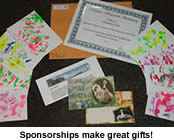
Get to Know
Your Predators: The Raccoon
Raccoons weigh around thirty pounds. They prefer to do
most of their dirty work in darkness; however, they can
sometimes be seen during the day.
The
number one thing that raccoons do is look for food, so
do not underestimate the determination of this crafty
predator. They are lured in by duck food and the ducks
themselves. They are very good problem solvers and
excellent lock picks. I can remember a few occasions as
a youngster when a raccoon let our chickens out while
getting at the grain. Padlocks, thankfully, are beyond
their capabilities.
Raccoons are capable of tearing and biting through
aviary netting and poultry fencing to get at your ducks.
A raccoon will employ every tactic at its disposal to
get at your flock. Worst of all, raccoons have been
known to eat a duck right through the fencing if they
can get their paws on any part of the sleeping bird.
Avoid
luring raccoons into your yard by keeping attractive
food items out of their reach. Predator urine (available
at your local grain store) applied often around your
enclosure may help keep raccoons away, but don’t rely on
this measure alone. You may have some added success by
keeping motion lights around your barn at night, but
once they grow accustomed to this, it will lose its
effectiveness. A dog is not necessarily a good idea to
keep raccoons away from your pens since a confrontation
will most likely end with your dog in a vet office. As
with any wild animal, be extremely cautious of rabies
when dealing with raccoons. They are known carriers in
many regions.
A
REMINDER ABOUT RABIES…
Whenever you are dealing with wild animals, be it
the animal itself, or the remains of its kill, ALWAYS
wear protective clothing. DO NOT touch wild animals or
prey animals (either living or dead) with your bare
skin. Thoroughly clean or discard any clothing or items
that have touched the wild animal or prey animal.
The Month in
Photos!
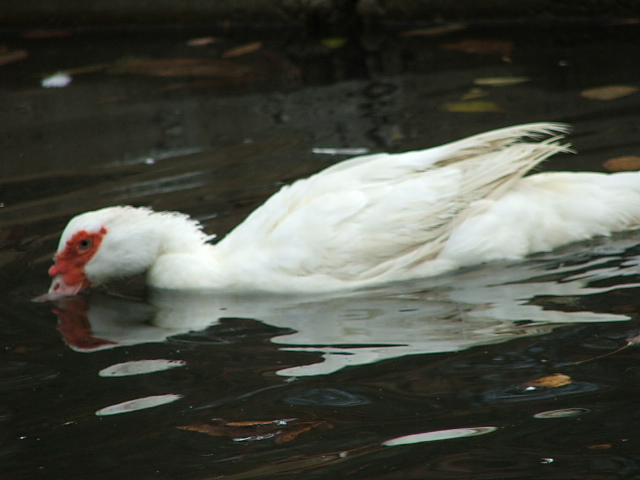
Daphnee
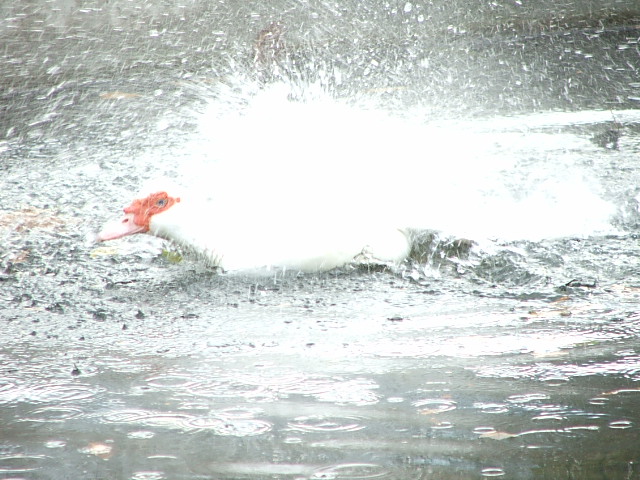
Daphnee SPLASHES!

Clean up detail!
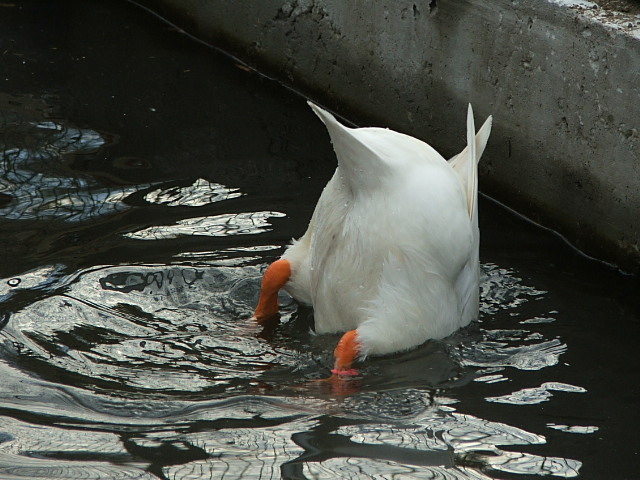
Bottoms up!
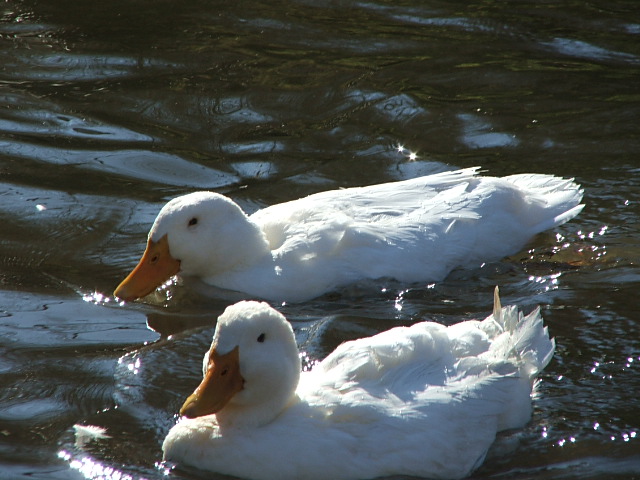
Elijah & Joven...
best friends...
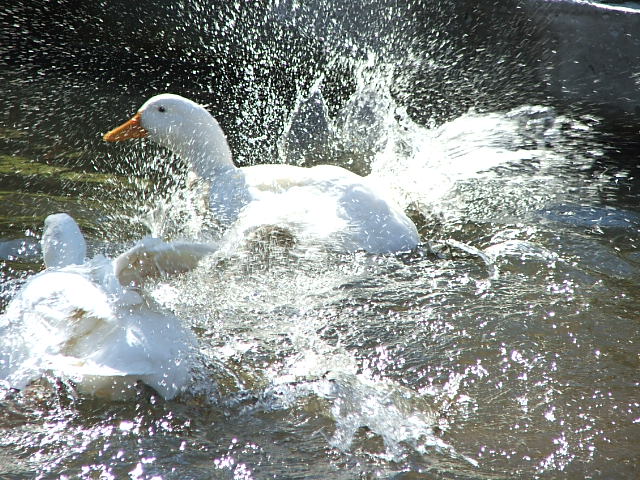
The boys SPLASH!
Recommended
Reading*
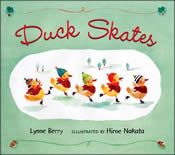
|
Ordering information
|
Duck
Skates
By Lynne Berry
Illustrated by Hiroe Nakata
|
* |
For our full recommended reading list, click
here.
If you order from Amazon.com by way of our web site,
Majestic receives a portion of the proceeds! |
Book Description
Five ducks
spend the day frolicking in the snow, then return home to
cocoa and sleep. Their activities are described in clever,
rhyming verses with one or two sentences per page that
subtly present simple math concepts: Five ducks tramp. Ten
boots stamp. Their antics often divide them into smaller
groups. Three ducks slip down the hill and slide. Two ducks,
stomping, tromp inside. When they skate past a sign that
reads STOP! SNOW! they crash into a deep pile and begin a
snowball fight.
The
illustrations follow the text exactly, allowing children to
count the ducks engaged in each activity. The
watercolor-and-ink pictures convey the playfulness in warm,
cozy tones, and a surprising amount of expression is
conveyed in simple lines. The steady rhythm makes this an
appealing choice to read aloud, particularly one-on-one or
with a small group.
Reader Poll
#12
Question:
What is your favorite part of the Majestic Monthly
newsletter?
Results of Reader Poll #11
What
topics/subjects would you like to read about in future
Majestic Monthly newsletters?
Answer: Do we
need to heat our barns in winter? (Read article in this
newsletter to find out!)
Contact Us
Majestic Waterfowl
Sanctuary
17 Barker Road
Lebanon, CT 06249
directorATmajesticwaterfowl.org
Our Newsletter
The Majestic Monthly is published 12
times per year. Back issues can be obtained online from our
Newsletter Archives.
|
|
|
Season's
Greetings!
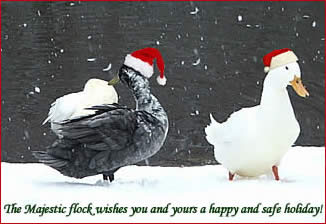
|
Where are They Now: You
Let Us Know!
Dodger, Delia &
Doris
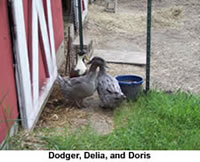 Dodger,
Delia, and Doris are still shy, but they talk to me when I come into
the barn to let them outside. I love all animals, so I'm glad to be
able to give these birds a home. Our geese were in a bad situation,
too. They were given to me by a lady who kept them in a very small
pen. They are much happier now. They all have a lot of room and a
safe place to sleep in the barn at night. The geese tend to rule the
roost, in that they get first pickings on the greens and treats. So
I feed the ducks separately in their pen. But during the day the
ducks steal food from the goose pen, so it all evens out. Dodger,
Delia, and Doris are still shy, but they talk to me when I come into
the barn to let them outside. I love all animals, so I'm glad to be
able to give these birds a home. Our geese were in a bad situation,
too. They were given to me by a lady who kept them in a very small
pen. They are much happier now. They all have a lot of room and a
safe place to sleep in the barn at night. The geese tend to rule the
roost, in that they get first pickings on the greens and treats. So
I feed the ducks separately in their pen. But during the day the
ducks steal food from the goose pen, so it all evens out.
Six Duckies to
Kentucky
While
at a golf course the week before Easter in 2003, we could not have
imagined how much our life was going to change. We found a
couple-day-old duckling, and decided to take her home. We knew
nothing about ducks, but spent a lot of time on the internet
learning everything we could...that's how we eventually came across
Kim and Majestic Waterfowl Sanctuary, which led to adding six more
wonderful ducks to our original Qwaka.
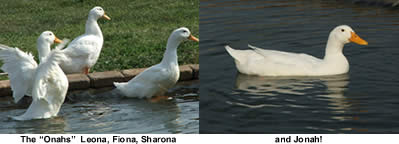
In
January of this year we decided to adopt Fiona from Majestic because
we thought that Qwaka could use some company. They were quick
friends. Then, while keeping up with Kim and Majestic, we read the
story about Joseph and we knew we wanted to give this sweet duck a
home also. When I drove to Connecticut to pick up Joseph and saw
what great friends he was with Jonah we decided, heck, what's the
difference between three ducks or four? Jonah and Fiona recognized
each other from Spaulding pond (where they were both rescued from)
immediately! Qwaka wasn't too sure about boys, but it didn't take
too long for her and Joseph to be inseparable!
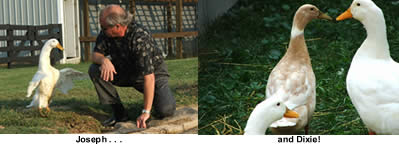
Our
"what's a few more" philosophy came into play in September with a
visit from Kim, which resulted in a rescue on Waterford pond that
brought us our darling three new girls, Sharona, Leona, and Dixie!
They are all one big happy family and love their lives on Sideways
Farm in Wilmore, Kentucky. And we couldn't be happier with our
flock...they make our lives so much more full!
Dale
(Formerly "Standish"):
A Big Boy!
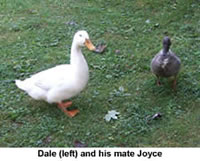 We
thought Dale was the biggest drake we had every seen…well, you
should see his kids! He hooked up with Joyce, a rescued Blue Swede
hen, and they were right to name their son Godzilla! Dale is
enjoying life in the lap of luxury. He has a roomy daytime run with
kiddy pool and a safe night time lock up that he and his flock
share. Dale and his family enjoy a daily treat of leaf lettuce and
have even been known to play some soccer with the other ducks using
the leftover lettuce core! We
thought Dale was the biggest drake we had every seen…well, you
should see his kids! He hooked up with Joyce, a rescued Blue Swede
hen, and they were right to name their son Godzilla! Dale is
enjoying life in the lap of luxury. He has a roomy daytime run with
kiddy pool and a safe night time lock up that he and his flock
share. Dale and his family enjoy a daily treat of leaf lettuce and
have even been known to play some soccer with the other ducks using
the leftover lettuce core!
Melusine
(Formerly "Lucky")
& Jake the Drake
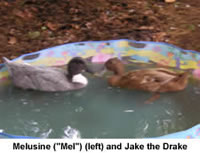 Jake
and Mel are wonderful! I love to watch them swim and waddle around
my back yard. They are enjoying our big backyard buffet of food,
their kiddie pool and the adventures of the yard (it’s so big to
them they have only explored half of it). They get to share the
space with the dog and neither gets in each others way. They easily
go into their cage at night and out in the morning, they come to us
when we go outside. Mel is still getting used to us holding her, but
Jake is a big picker-upper; he loves it! Jake
and Mel are wonderful! I love to watch them swim and waddle around
my back yard. They are enjoying our big backyard buffet of food,
their kiddie pool and the adventures of the yard (it’s so big to
them they have only explored half of it). They get to share the
space with the dog and neither gets in each others way. They easily
go into their cage at night and out in the morning, they come to us
when we go outside. Mel is still getting used to us holding her, but
Jake is a big picker-upper; he loves it!
Donald & Daisy
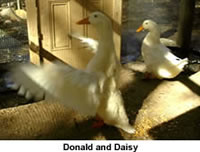 Donald
and Daisy are doing great. They are beautiful birds, and we are
having fun with them. They are getting along pretty well with the
others (Wilma, Wellington, and Webster). We started digging another
yard for the ducks! 7.5' X 16' I have a nice big fish pond and would
like to put it in for them. I know they would love it. Donald
and Daisy are doing great. They are beautiful birds, and we are
having fun with them. They are getting along pretty well with the
others (Wilma, Wellington, and Webster). We started digging another
yard for the ducks! 7.5' X 16' I have a nice big fish pond and would
like to put it in for them. I know they would love it.
Viggo, Liv, &
Anna
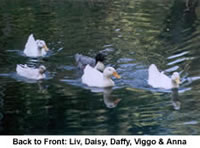 The
ducks enjoyed the pond by day in the summer—however shallow it
became, and a cozy barn at night that they share with the guinea
hens and chickens. Anna and Viggo join Daisy and Daffy venturing
throughout the large yard in search of tasty morsels while Liv
prefers to sunbathe by the side of the pond—never venturing far from
the edge. She is capable of getting around quite well on foot and in
the water, but prefers to relax pond-side most of the time. They
spend most days out in the fresh air and willingly return to the
comforts of the barn at night. The
ducks enjoyed the pond by day in the summer—however shallow it
became, and a cozy barn at night that they share with the guinea
hens and chickens. Anna and Viggo join Daisy and Daffy venturing
throughout the large yard in search of tasty morsels while Liv
prefers to sunbathe by the side of the pond—never venturing far from
the edge. She is capable of getting around quite well on foot and in
the water, but prefers to relax pond-side most of the time. They
spend most days out in the fresh air and willingly return to the
comforts of the barn at night.
|
Talulah |
|
|
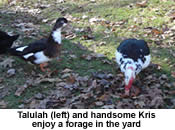 |
Talulah is very happy in her
new home with her new flock of friends! |
| |
|
Abby & Amelia |
|
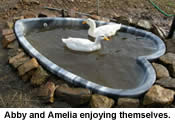 |
How about these spoiled ducks
in a heart-shaped tub?! We love it! Both girls are doing
great and enjoying their new home with their companion drake
Ping |
|
|
|
John |
|
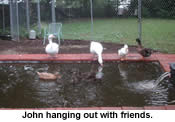 |
John has fully integrated into his flock. Priscilla, his
Pekin lady friend, is quite the flirt—courting both males,
who have been quite cordial to each other, under the
circumstances! |
Clark Cluck, Petunia, & Violet
(Formerly Hewey,
Dewey, & Lewey)
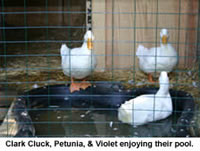
The beautiful trio are doing
well, enjoying their new life and apparently enjoying their little
pond as well!
Phebes
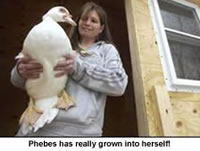 Look
at the coloring on this beautiful Muscovy hen! Phebes came to us
with pale white feet and bill. If you recall she came to us with the
tip of her upper bill missing. Look
at the coloring on this beautiful Muscovy hen! Phebes came to us
with pale white feet and bill. If you recall she came to us with the
tip of her upper bill missing.
A few
months after joining her new family and getting on a good diet, her
feet turned yellow and her red mask appeared. Phebes shares her
heated barn with indoor pond and her outdoor enclosure with her pal
Joey.
Aflac
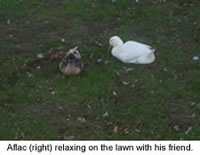 Since
my rescue, I have enjoyed steady eats, great shelter, bathing
facilities, and the companionship of three other ducks, as well as
Shirley, our guardian goose. While Shirley is our guardian, I
quickly appointed myself as leader of the pack! After eating
breakfast, my friends and I will patiently pace back and forth at
the gate. Finally, our owner will open the gate, and as I lead my
friends out to the freedom of the yard, we all vocally express our
heartfelt "thank you"! Once "on the loose" I generally take the lead
and all ducks and a goose are on a treasure hunt! Since
my rescue, I have enjoyed steady eats, great shelter, bathing
facilities, and the companionship of three other ducks, as well as
Shirley, our guardian goose. While Shirley is our guardian, I
quickly appointed myself as leader of the pack! After eating
breakfast, my friends and I will patiently pace back and forth at
the gate. Finally, our owner will open the gate, and as I lead my
friends out to the freedom of the yard, we all vocally express our
heartfelt "thank you"! Once "on the loose" I generally take the lead
and all ducks and a goose are on a treasure hunt!
A large country lawn may provide for
the usual grass, bugs, and the like, but dessert consists of the
scrumptious flowers lovingly planted by the owners. Because the
owners believe in healthy eating, we are not allowed to indulge
endlessly on flowers, leaving us to find other dietary delights.
After our mid-morning nap and a swim, we huddle and I again motivate
the gang, giving orders and leading them into temptation—my
favorite being that of the wooded area at the edge of the lawn. This
area is great in the summer, providing cool shade and numerous
eating delights. However, once again our owner only allows this
adventure to last for a limited time before we are lovingly escorted
back to our swimming pool in the backyard.
Does Your Barn Need
Heating in Winter?
For
most regions of the U.S., the answer to this question is no. If you
have some kind of wall insulation and a thick layer of bedding (at
least 4 inches compacted) under their feet your ducks will be fine
during colder temperatures. The more ducks and geese you have
cuddling together, the warmer your flock will be.
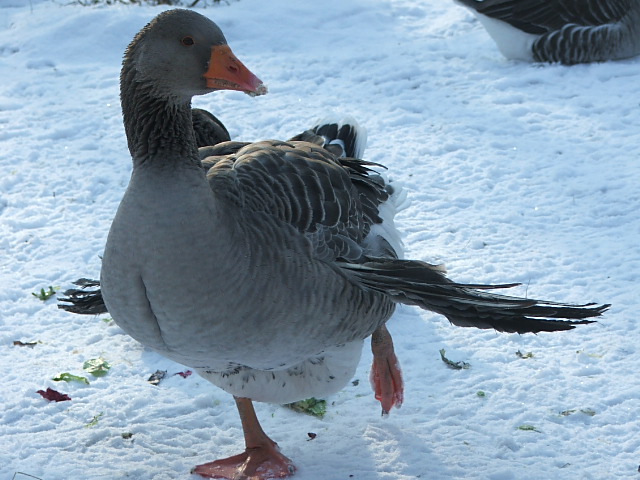 Be
wary of weather warnings in your area; during extreme cold (temps
below freezing) you may need to periodically heat their enclosure
with a space heater or heat lamp. Plug it in only while you are
present and able to monitor its functioning—you can visit your
feathered friends while it works. If your shelter is properly
insulated and draft-free, the heater will take the chill out of the
air. REMEMBER to turn the heater source off and unplug it before you
leave. Availability of warm drinking water is always a nice way to
keep your ducks warm from the inside on cold days. Be
wary of weather warnings in your area; during extreme cold (temps
below freezing) you may need to periodically heat their enclosure
with a space heater or heat lamp. Plug it in only while you are
present and able to monitor its functioning—you can visit your
feathered friends while it works. If your shelter is properly
insulated and draft-free, the heater will take the chill out of the
air. REMEMBER to turn the heater source off and unplug it before you
leave. Availability of warm drinking water is always a nice way to
keep your ducks warm from the inside on cold days.
Some sources will say a heated barn
will disrupt or confuse waterfowl’s molting cycle, but since ducks
survive without any difficulty or confusion in our lower, warmer
states; we believe this is a myth. Ducks and geese always appreciate
heat, but try to avoid using any heating devices while you are not
present. If you have a heating system, be sure it is professionally
installed and maintained to avoid fire hazards.
Remember, ducks still need to bathe in
the winter to keep their feathers preened for good insulation. In
extreme cold weather, be sure they get a chance to bathe at least
2-3 times a week for 10-15 minutes in a basin or tub.
|